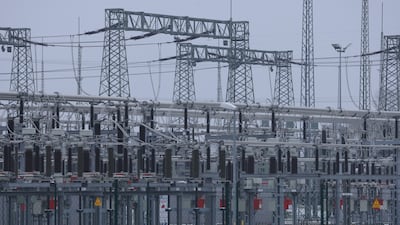A regional grid operator in Germany asked users to reduce demand for an hour after requesting imports from Switzerland to help balance its network.
TransnetBW posted a red alert on its app asking consumers to save electricity starting at 2pm local time.
That does not mean that power cuts are to be expected or that the grid is unstable, said Claudia Halici, a spokeswoman for TransnetBW.
“But it does signal that TransnetBW must do more than usual to keep the power grid stable,” Ms Halici said.
Cold weather, low wind and France’s struggles to boost its nuclear power capacity are putting pressure on Germany’s energy systems after Russia cut gas supplies.
Even though gas storage sites are almost full, the network will be tested as cold weather sets in, with southern regions facing extra stress caused by lower renewable-energy capacity.
Green energy sources - in pictures
TransnetBW’s request for more than 700 megawatts from Switzerland was necessary because some reserve power plants in its area were not available.
But electricity exports were not affected, the utility said.
The regional grid operator decided to ask customers to save energy so it would not have to power up fossil-fuel plants, a move that is not only costly but also contributes to already high pollution.







